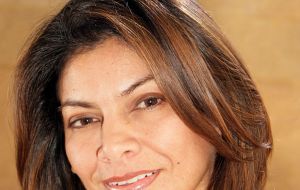MercoPress. South Atlantic News Agency
Costa Rica elects president and renews Legislative next Sunday
 Laura Chinchilla from the ruling party leads according to opinion polls
Laura Chinchilla from the ruling party leads according to opinion polls Costa Rica next Sunday will be electing a successor to president Oscar Arias out of nine hopefuls among which leading public opinion polls is his sponsored candidate, Laura Chinchilla, followed by Conservative Otto Guevara and Socialist Ottón Solis.
The main issues of the campaign have been insecurity and economic affairs, but as usual in the long established Costa Rican democracy, candidates with strong personalities and support from well organized political parties that play significant roles have the best chances.
Chinchilla, 50 is a political scientist, protégé of president Arias and has the support of the oldest and most efficient political machinery of the country, National Liberation party, originally social-democrat but which has gradually moved to the centre right.
The incumbent candidate has been Justice Minister and Vice-president of the Arias administration and if she wins, she will become the first woman president in Costa Rican history.
Otto Guevara, a 49 year old solicitor is on his third presidential bid and has targeted his campaign on attacking the alleged corruption of the Arias administration.
An ultra liberal (in economic terms) who counts with six deputies from the Natiopnal Libertarian party in the assembly, Guevara has moderated his speech but dropped a bombshell when he proposed that the country scrap the local currency for the US dollar.
Socialist Solis, 55, is also on his third presidential bid (last time he lost to Arias by one percentage point of votes cast) has been steadily climbing in the opinion polls by targeting Chinchilla whom she identifies as a “puppet” of the current president and his brother, Rodrigo Arias, Planning Minister.
Polls have Luis Fishman, a Social Christian in fourth place who has had a positive echo with his simple and direct campaign slogan “I’m the least bad of all candidates”.
“Announced government programs are not that different, it’s a matter of shades”, according to economist Juan Manuel Villasuso who adds that the big difference will be in the transport infrastructure of the different political parties.
Costa Rica has 6.617 voting circuits, but also many mountains in the relatively small Central American territory, so the party with best logistics can make it a day.
Precisely the ruling National Liberation party has 105.000 volunteers registered, 30.000 of which at voting booths, 60.000 guides in the streets and 15.000 involved in transport logistic with coaches, mini buses, taxis and private cars.
René Caballero head of Chinchilla’s campaign said they expect to give rides to 150.000 voters next Sunday.
If none of the candidates garners 40% of cast valid votes next Sunday a run-off is scheduled for April 4.
An estimated 200 international observers including fifty from the Organization of American States will be present next Sunday to monitor the transparency of the election.
The latest poll to be released Wednesday from Unimer shows Ms Chichilla leading with 41% of vote intention. She is followed by Otto Guevara, 23% and Otton Solis, 20%. The survey with an error margin of 3.2 percentage points was taken January 24/30 with 1.322 interviews.
Costa Rica in turbulent Central America is a long time ally of the United States which has invested heavily in the country including a free trade agreement. Costa Rica is also the only Latinamerican country with no Army although it does have a well equipped National Guard.




Top Comments
Disclaimer & comment rulesCommenting for this story is now closed.
If you have a Facebook account, become a fan and comment on our Facebook Page!